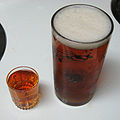Drinking culture of Korea: Difference between revisions
CSV import |
CSV import |
||
| Line 37: | Line 37: | ||
{{Korea topics}} | {{Korea topics}} | ||
{{food-stub}} | {{food-stub}} | ||
<gallery> | |||
File:Danwon-Jeomsim.jpg|Traditional Korean meal setting | |||
File:Hyewon-Dano.pungjeong.jpg|Korean traditional festival scene | |||
File:Korean_table_manner_while_drinking-01.jpg|Korean table manner while drinking | |||
File:Boilermaker.jpg|Boilermaker drink | |||
File:Korean_mung_bean_pancake_and_rice_wine-Bindaetteok_and_makgeolli.jpg|Bindaetteok and makgeolli | |||
File:Chimek.jpg|Chimek (chicken and beer) | |||
</gallery> | |||
Latest revision as of 11:00, 18 February 2025
Drinking Culture of Korea
The Drinking Culture of Korea is a significant aspect of Korean social and cultural life. It is deeply ingrained in the society and has unique customs and etiquette. The drinking culture is often associated with the consumption of traditional Korean alcoholic beverages such as Soju, Makgeolli, and Bokbunja-ju.
Traditional Korean Alcoholic Beverages[edit]
Soju[edit]
Soju is a clear, colorless distilled beverage of Korean origin. It is usually consumed neat, and its alcohol content varies from about 16.8% to 53% alcohol by volume (ABV). Soju is the best-selling alcohol in the world, primarily sold in Korea.
Makgeolli[edit]
Makgeolli, also known as Makkoli, is a slightly sweet alcoholic beverage native to Korea. It is a rice wine made from the fermentation of rice and water. Makgeolli is traditionally served in a bowl and is a popular drink with farmers.
Bokbunja-ju[edit]
Bokbunja-ju is a Korean fruit wine made from wild and/or cultivated bokbunja (Korean black raspberry). It is produced in Gochang County, Jeollabuk-do, and is often consumed for its perceived health benefits.
Drinking Etiquette[edit]
Korean drinking culture is rich with etiquette, some of which include never pouring your own drink, always receiving a drink with two hands, and turning away from elders when drinking. These customs are deeply rooted in Confucian values of respect and consideration for others.
Drinking Games[edit]
Drinking games are a common part of Korean drinking culture. Games such as Titanic, The Bottle Cap Game, and Three-man are popular and are often played to liven up the drinking atmosphere.
Health Impact[edit]
While the drinking culture is a significant part of Korean society, it has also led to concerns about alcoholism and related health issues. The Korean government has implemented various measures to address these concerns, including stricter regulations on alcohol advertising and increased education about the dangers of excessive drinking.
See Also[edit]
| Alcohol in Asia | ||||||
|---|---|---|---|---|---|---|
This Alcohol in Asia related article is a stub.
|
| Korea topics | ||||||||||
|---|---|---|---|---|---|---|---|---|---|---|
This Korea-related article is a stub. You can help WikiMD by expanding it.
|
-
Traditional Korean meal setting
-
Korean traditional festival scene
-
Korean table manner while drinking
-
Boilermaker drink
-
Bindaetteok and makgeolli
-
Chimek (chicken and beer)






